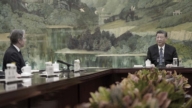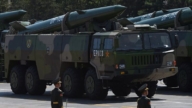【新唐人2014年02月20日訊】自從中國「雜交水稻之父」袁隆平撰文警告,中國糧食危機無法避免,將隨時引爆中國社會危機後,中共當局卻一再強調「糧食安全」,引發相關問題的討論。中國糧食危機無法避免嗎?下面聽聽專家的分析。
中國農業科學家袁隆平在一篇題為「中國最大的劫難已無法避免」的文章中,羅列了關於中國糧食危機無法避免、隨時爆發的十二個理由。
文章歷數中國如果出現糧食短缺將出現的可怕現象,包括:中國糧食自給率、食用油自給率之低,糧食安全之毫無底線,各類激素、環境的污染對食物鏈安全的憂慮,以及種子資源外資化、轉基因食品氾濫、國家糧食儲備之弱,以及糧食收購價格之低,導致農民種糧積極性差等。
文章最後嘆息:我眼前浮現的分明是一片混亂、人相食、餓殍遍地、流離失所的情景,隨時都可以發生,並且已經不可避免。
北京《國情內參》刊物首席研究員鞏勝利指出,近年來,中國糧食進口急劇上升,糧食自給率不斷創新低,所以袁隆平的警告並非危言聳聽。
北京《國情內參》首席研究員鞏勝利:「黃豆的荳油,橄欖油,菜籽油,這幾年中國一直比較短缺,特別是黃豆,據說產量非常低,黃豆的缺口造成了中國糧食的最大的缺口,吃的那種油啊,現在中國進口大概70%左右,這個問題是非常嚴峻。」
在2011年以前,中國僅允許進口少量的大米和小麥,而玉米進口量近乎為零。但是,中共國務院發展研究中心2011年預測,中國糧食進口量將由1997年的416萬噸,增加到2020年的2224萬噸;但在2012年,中國糧食進口總量已超過7000萬噸。中國的糧食自給率受到威脅,突破了中共早前制定的糧食自給率須保持在95%以上的「紅線」。
國外也擔心,中國的糧食需求將導致全球糧食供應短缺?
據世界糧食規劃署中國區代表黃安生(Brett Rierson)去年的說法,中國目前已經成為世界上第二大稻米跟大麥的進口國,也是排名第十的玉米進口國,和前二十名的小麥進口國。
中國經濟學者茅於軾:「中國應該進口糧食,因為中國糧食生產成本高,像美國這些地方生產成本低,所以應該進口,人家便宜的糧食你不吃,你吃貴的糧食你不是傻瓜嗎? 」
但,中國大量從美國、巴西等國進口糧食,不但衝擊了全球糧食價格,也打擊了中國農民種田的積極性,更導致中國糧食出現危機的原因之一。
有人擔心,中國一旦受到國際社會的禁運,糧食安全將得不到保障。茅於軾認為,如果國際對中國禁運糧食,一定是中共做了大惡事,即使有糧食吃,中國人的生活也好不了。
去年11月底,中共總書記習近平在山東農科院座談會上發表講話時說,手中有糧,心中不慌,他還警告,一旦發生大饑荒,有錢也沒用。
12月中旬,中共經濟工作會議上,把「切實保障糧食安全」列為了2014年經濟六大任務的首位,並提出「谷物基本自給」、「適度進口」的口號和目標。
到了12月下旬,中共的農村工作會議上,七名政治局常委齊到場,再次強調糧食安全,要求「確保谷物基本自給、口糧絕對安全,耕地紅線要嚴防死守」等。
今年的1月19號,中共公布的「中央一號文件」中,再次把「糧食安全」列入了首要地位。
中國農業生物工程學者張開指出,中共一再強調糧食的重要性,說明它也看到了中國糧食危機已迫在眉睫,但卻沒看到當局出臺任何實質性的解決方案。
中國農業生物工程學者張開:「而且它迴避了一個最重要的問題,就是要想產糧食的話必須需要土壤和水,而土壤的污染還有水的污染,這兩個條件不解決的話,糧食的安全問題永遠都不會解決。」
去年中國大陸律師曾經要求當局:公布預算經費達10億元的全國「土壤污染狀況」調查報告,但被環保部以「數據屬於國家機密」為由拒絕。而去年底,國土資源部副部長王世元說,中國約有5000萬畝因重度污染,無法種植農作物。
採訪編輯/李韻 後製/陳建銘
Can China’s Food Crisis Be Avoided?
After Yuan Longping, the “father of hybrid rice”,
warned that China’s food crisis could occur at any time,
which would trigger a social crisis, the regime
has repeatedly emphasized the food security issue.
The topic has sparked heated debate.
Can the food crisis be avoided?
Let’s take a look at experts’ analysis.
Agricultural scientist Yuan Longping wrote an article entitled
“China’s Biggest Catastrophe Unavoidable.”
He lists 12 reasons why the food crisis cannot be avoided
and is ready to break out.
The article suggests that if China’s food supply is insufficient,
a terrible phenomenon will occur.
Potential crises include a lowered food self-sufficiency rate
and cooking oil self-sufficiency rate;
no food security bottom line, environmental pollution
and various hormones leading to food chain security
problems; seed resources influence by foreign technology,
flooding of Genetically Modified foods and weakness
of national storage food;
Farmers lose motivation to plant grain
due to the low price of purchasing food.
The article concludes, “A chaotic scene appears in front
of me – cannibalism, homelessness and starvation.
It can happen at any time, and it cannot be avoided.”
Gong Shengli, lead researcher at National Reference financial
magazine, says that in recent years China’s food imports
sharply rised and the food self-sufficiency rate constantly
sunk, thus Yuan Longping’s words are not exaggerated.
Gong Shengli: “Soybean oil, olive oil, and other seed oil
have been in short supply for several years,
especially soybean – sources say its production is very low.
The shortage of soybean causes the largest food insufficiency.
70 percent of (China’s) cooking oils are imported,
it is very serious.”
Before 2011, China only allowed small amounts
of rice and wheat to be imported.
They import almost no corn.
In 2011, the China state council research center predicted
that grain imports would increase from 4.16 million tons
in 1997 to 22.24 million tons in 2020.
However, in 2012, food imports exceeded 70 million tons,
threatening the food self-sufficiency rate, and going below
China’s bottom line of keeping food the self-sufficiency rate
above 95 percent.
Foreign countries are also worried that China food demands
will cause a global food shortage.
According to Brett Rierson, director of the World Food
Program’s China Liaison Office, last year China became
the world’s second leading importer of rice and barley,
the tenth leading corn importer and was among the top 20
wheat importers.
Mao Yushi, Chinese economist: “China should import grain,
because China’s grain production cost is higher,
while the US and some other countries
have cheaper production.
Thus China should import grain.
The cheaper foods from other countries you don’t eat,
instead you choose expensive ones, aren’t you foolish?”
China imports large amounts of grain from the U.S.,
Brazil and other countries, which has not only influenced
global food price, but also affected Chinese farmers’
enthusiasm.
It is one of the reasons for China’s grain crisis.
Some people worry that if the international community places
an embargo on China, food security won’t be promising.
Mao Yushi believes that if it happens, the Chinese
regime will have committed a great sin – although there
is enough food, people’s lives still cannot change
for the better.
At the end of November 2013, communist party leader
Xi Jinping addressed Shandong Academy
of Agricultural Sciences.
He said if “food is in the hands, the heart won’t be panicked.”
Xi also warned that once a famine occurs,
money will be useless.
In mid-December 2013, at an economy work meeting,
food security was listed as 2014’s top priority.
In addition, it was declared that the goals of “grain
self-sufficiency” and “moderate imports” must be achieved.
Seven standing committee members attended
the rural work meeting in late December 2013.
They again stressed the food security issue.
They requested that food self-sufficiency be secured,
food rations be kept absolutely safe,
and to “strictly stay within the arable red line.”
On Jan. 19, the central regime’s infamous No. 1 document
listed food security as the top priority again.
Zhang Kai, China Agricultural Bioengineering scholar,
points out that China’s repeated stressing of the importance
of food means they are also aware that China’s grain crisis
is approaching.
However, he hasn’t seen any practical plan
created to solve the problem.
Zhang Kai: “The regime is avoiding an important issue –
to produce grain, there must be soil and water.
Without solving the pollution of soil and water issues,
the food problem cannot be solved.”
In 2013, Mainland lawyers requested that the regime publicize
the national soil pollution’s status survey report,
which costs one billion yuan of the budget.
However, the environmental ministry refused these lawyers’
request because national soil pollution was classified
as a state secret.
In late 2013, Wang Shiyuan, deputy minister
of Land and Natural Resources said that plants will not grow
on about 50 million mu (3.33 million hectares) of land
due to the existence of heavy pollution.
Interview & Edit/Liyun Post-Production/Chengjianmin




























